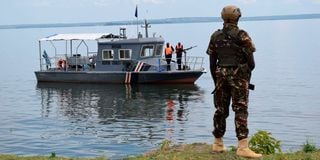Breaking News: At least 10 feared to have drowned in Makueni river
Locals hail Coast Guard as crime and accidents abate in Lake Victoria

An officer from the Border Patrol Unit watches as his counterparts from the Kenya Coast Guard Service (KCGS) patrol Lake Victoria near Mbita Town in December 2021 during the launch of a KCGS station in Homa Bay County.
There is a new sheriff in town and, just like in the American Wild West where the saying originates, the crime buster is here to lay down the law and catch the bad guys.
The new sheriff in Lake Victoria is the Kenya Coast Guard Service (KCGS), and their presence in the world’s second-largest freshwater lake is meant to enforce maritime law and fight crime.
While the only requirement for one to be a fisherman is the ability to pull nets full of fish into a boat, coxswains are also required to acquaint themselves with maritime laws, including formal training on how to navigate vessels, which should also be certified to operate in the lake. However, failure by the government to enforce these regulations has given fishermen free rein.
This was until recently when agencies like the KCGS and Kenya Maritime Authority (KMA) began operating in Lake Victoria.
Before December 2021, the government had not invested in the security and safety of people using Lake Victoria for various economic activities.
Contraband goods
Anything that happened on the water was not followed up by any security agency. For example, when a crime was committed on land and suspects escaped to the lake, perhaps to hide on an island or cross into neighbouring countries, security officers had difficulties going after them because they lacked vessels for such operations. Criminals took advantage of this to make the lake their haven. Trade in contraband goods and drug trafficking boomed.
At one time, criminals turned to piracy as they attacked fishermen, stole their fish and gear and sometimes killed those who resisted. Fishermen also complained of being harassed by security officers from Uganda and Tanzania.
All these vices and challenges have been reduced significantly, thanks to KCGS officers, who are based in Mbita Town. Their work is to patrol the lake to ensure safety and security.
“We also fight illegal businesses and ensure everyone complies with the law,” says Lieutenant George Obel, the officer in charge of KCGS in Homa Bay County. Before they started operating in Lake Victoria a year ago, Lt Obel says, “there were a lot of deaths. People were drowning because of carelessness”.
On September 21, 2021, 10 people drowned when their boat capsized at Koginga beach in Homa Bay town. This marked the beginning of reforms after it was found that failure to enforce the law may have contributed to accidents and deaths.
The Parliamentary Committee on Administration and National Security visited Homa Bay County after the accident to assess the level of security and safety preparedness in Lake Victoria.
What they discovered shocked them. They were told that fishermen were the first to respond to distress calls.
But inferior boats and lack of experience hampered rescue efforts. KMA arrived more than 40 minutes later when most people had died. This is because they were initially based in Kisumu and officers had to travel for quite a distance.
The committee was told that the absence of law enforcers was the main reason why fishermen and traders disregard the law. The lake in Homa Bay has many islands used as fishing grounds.
Lack of resources
Some of the islands like Remba and Mfangano have police bases but officers don’t have resources to enable them to move in the water.
Today, however, the KCGS base in Mbita is used as a centre for conducting security operations. Lt Obel says cases of accidents and crime have reduced. One of the areas KCGS has scored big is the elimination of illegal fishing gear and ensuring compliance with safety standards.
“From time to time, we conduct civic education to encourage fishermen to comply with safety standards,” Lt Odera says. KCGS station serves Kisumu, Homa Bay, Siaya and Migori counties. The choice of Mbita is based on a maritime security report conducted in the four counties.
Lake users in Homa Bay County were found to be faced with a lot of challenges ranging from harassment by security officers from the neighbouring counties to non-compliance with maritime safety regulations.
Mbita Town was found to be suitable as it would serve four counties in combating maritime crime and improving compliance with safety regulations.
Homa Bay County Commissioner Moses Lilan says the establishment of the base is part of the government’s efforts to boost the blue economy.
KCGS works with officials from Kenya Fisheries Service, Kenya Revenue Authority, immigration and customs, KMA and Border Patrol Unit.
Mr Julius Ochieng, the beach management unit chairman at Kisui beach, says cases of crime that targeted fishermen have reduced ever since the KCGS established their base there.
The good work of the officers however comes with its own set of challenges. Some fishermen have accused them of violating their rights. Suba Beach Management Unit chairman William Onditi says complaints include extortion, where the officers allegedly demand bribes to set fishermen free after arrest.
KCGS Sergeant Samson Opiyo, who is in charge of patrols, however, refuted the claims.
“Fishermen used to have a free hand to operate in the lake. Those who thought they could do illegal activities at will are now afraid,” he said.




